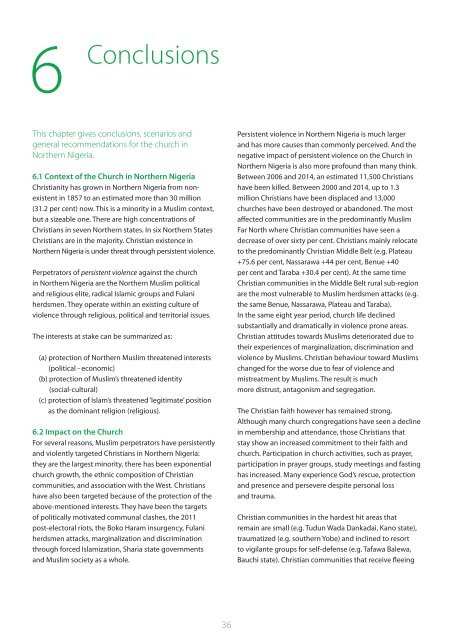Crushed but not defeated
7WFxo1ZWc
7WFxo1ZWc
Create successful ePaper yourself
Turn your PDF publications into a flip-book with our unique Google optimized e-Paper software.
6 Conclusions 36<br />
This chapter gives conclusions, scenarios and<br />
general recommendations for the church in<br />
Northern Nigeria.<br />
6.1 Context of the Church in Northern Nigeria<br />
Christianity has grown in Northern Nigeria from nonexistent<br />
in 1857 to an estimated more than 30 million<br />
(31.2 per cent) now. This is a minority in a Muslim context,<br />
<strong>but</strong> a sizeable one. There are high concentrations of<br />
Christians in seven Northern states. In six Northern States<br />
Christians are in the majority. Christian existence in<br />
Northern Nigeria is under threat through persistent violence.<br />
Perpetrators of persistent violence against the church<br />
in Northern Nigeria are the Northern Muslim political<br />
and religious elite, radical Islamic groups and Fulani<br />
herdsmen. They operate within an existing culture of<br />
violence through religious, political and territorial issues.<br />
The interests at stake can be summarized as:<br />
(a) protection of Northern Muslim threatened interests<br />
(political - economic)<br />
(b) protection of Muslim’s threatened identity<br />
(social-cultural)<br />
(c) protection of Islam’s threatened ‘legitimate’ position<br />
as the dominant religion (religious).<br />
6.2 Impact on the Church<br />
For several reasons, Muslim perpetrators have persistently<br />
and violently targeted Christians in Northern Nigeria:<br />
they are the largest minority, there has been exponential<br />
church growth, the ethnic composition of Christian<br />
communities, and association with the West. Christians<br />
have also been targeted because of the protection of the<br />
above-mentioned interests. They have been the targets<br />
of politically motivated communal clashes, the 2011<br />
post-electoral riots, the Boko Haram insurgency, Fulani<br />
herdsmen attacks, marginalization and discrimination<br />
through forced Islamization, Sharia state governments<br />
and Muslim society as a whole.<br />
Persistent violence in Northern Nigeria is much larger<br />
and has more causes than commonly perceived. And the<br />
negative impact of persistent violence on the Church in<br />
Northern Nigeria is also more profound than many think.<br />
Between 2006 and 2014, an estimated 11,500 Christians<br />
have been killed. Between 2000 and 2014, up to 1.3<br />
million Christians have been displaced and 13,000<br />
churches have been destroyed or abandoned. The most<br />
affected communities are in the predominantly Muslim<br />
Far North where Christian communities have seen a<br />
decrease of over sixty per cent. Christians mainly relocate<br />
to the predominantly Christian Middle Belt (e.g. Plateau<br />
+75.6 per cent, Nassarawa +44 per cent, Benue +40<br />
per cent and Taraba +30.4 per cent). At the same time<br />
Christian communities in the Middle Belt rural sub-region<br />
are the most vulnerable to Muslim herdsmen attacks (e.g.<br />
the same Benue, Nassarawa, Plateau and Taraba).<br />
In the same eight year period, church life declined<br />
substantially and dramatically in violence prone areas.<br />
Christian attitudes towards Muslims deteriorated due to<br />
their experiences of marginalization, discrimination and<br />
violence by Muslims. Christian behaviour toward Muslims<br />
changed for the worse due to fear of violence and<br />
mistreatment by Muslims. The result is much<br />
more distrust, antagonism and segregation.<br />
The Christian faith however has remained strong.<br />
Although many church congregations have seen a decline<br />
in membership and attendance, those Christians that<br />
stay show an increased commitment to their faith and<br />
church. Participation in church activities, such as prayer,<br />
participation in prayer groups, study meetings and fasting<br />
has increased. Many experience God’s rescue, protection<br />
and presence and persevere despite personal loss<br />
and trauma.<br />
Christian communities in the hardest hit areas that<br />
remain are small (e.g. Tudun Wada Dankadai, Kano state),<br />
traumatized (e.g. southern Yobe) and inclined to resort<br />
to vigilante groups for self-defense (e.g. Tafawa Balewa,<br />
Bauchi state). Christian communities that receive fleeing


